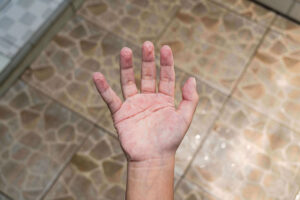 When managing wounds, distinguishing between various skin conditions like excoriation and maceration is essential. These issues, while related to skin health, affect the skin in different ways and require distinct approaches for treatment. DFW Wound Care Center specializes in understanding and treating such conditions to promote effective healing and prevent complications.
When managing wounds, distinguishing between various skin conditions like excoriation and maceration is essential. These issues, while related to skin health, affect the skin in different ways and require distinct approaches for treatment. DFW Wound Care Center specializes in understanding and treating such conditions to promote effective healing and prevent complications.
What is Excoriation?
Excoriation refers to the skin damage caused by scratching or when skin is abraded. It often appears as raw, irritated, and sometimes bleeding patches on the skin. Typically, excoriation is associated with itching or the physical act of scratching, which breaks the skin and can lead to further skin damage or infection.
Causes of Excoriation
- Chronic Itching: Often due to skin conditions like eczema, psoriasis, or allergic reactions.
- Nervous Habits: Such as compulsive scratching, which can be psychological in origin.
- Physical Irritants: Exposure to harsh chemicals or abrasive materials.
What is Maceration?
Maceration occurs when skin becomes overly soft and breaks down due to excessive moisture. This condition is commonly seen in wound care, where skin surrounding a wound becomes white and soggy, as it is excessively exposed to moisture from dressings, sweat, or other fluids.
What Causes Maceration in Wounds?
- Prolonged Exposure to Moisture: This can be from wound exudates, sweat, or incontinence.
- Inadequate Dressing Changes: Infrequent changes of wound dressings can trap moisture against the skin.
- Poor Wound Management: Ineffective management of wound drainage.
Is Maceration Dangerous?
While maceration itself is not typically dangerous, it can complicate wound healing. Overly moist skin is more susceptible to infection and can lead to delayed wound healing or the breakdown of previously healthy tissue surrounding the wound.
Excoriation vs. Maceration: What’s the Difference?
The primary difference between excoriation and maceration lies in their causes and appearance:
- Excoriation is due to physical damage from scratching which removes top layers of skin, leading to open, raw areas.
- Maceration is caused by excessive moisture that softens and eventually breaks down the skin, generally without open wounds initially.
Treatment Options for Excoriation vs. Maceration in Wounds
For Excoriation:
- Barrier Creams: To protect the skin and reduce irritation.
- Corticosteroids: To lessen inflammation and itching.
- Behavioral Strategies: Addressing underlying habits or psychological factors contributing to scratching.
For Maceration:
- Proper Wound Care: Ensuring regular and appropriate changes of dressings.
- Use of Highly Absorbent Dressings: To manage excess moisture effectively.
- Barrier Products: Such as films and ointments to protect surrounding skin.
Conclusion
Effectively managing excoriation and maceration involves understanding their distinct characteristics and implementing appropriate treatment strategies. At DFW Wound Care Center, we provide expert care tailored to address these and other wound-related complications, promoting faster healing and preventing further issues.
Struggling with wound care? Contact DFW Wound Care Center today for advanced treatment options tailored to your needs. Protect your skin, promote healing, and prevent future damage with the help of our specialized wound care professionals. Visit us online or call to schedule an appointment at our Plano, Lewisville, Irving or DeSoto locations.
Contact us
Schedule an appointment
with our specialists by contacting us or calling our:
